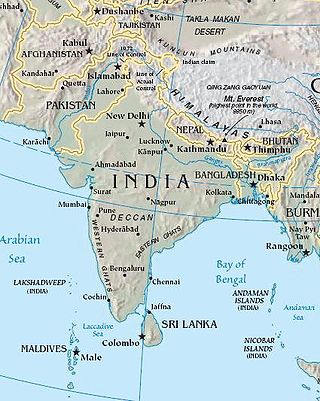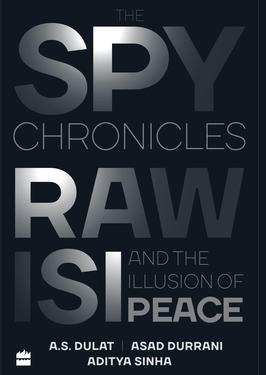The Research and Analysis Wing (R&AW) is the foreign intelligence agency of India. The agency's primary function is gathering foreign intelligence, counter-terrorism, counter-proliferation, advising Indian policymakers, and advancing India's foreign strategic interests. It is also involved in the security of India's nuclear programme.

Mahmud AhmedHI(M) is a retired Pakistani three-star rank army general who served as the Director-General of the Inter-Services Intelligence from 1999 to 2001.

The Inter-Services Intelligence is the premier intelligence agency of Pakistan. It is responsible for gathering, processing, and analyzing any information from around the world that is deemed relevant to Pakistan's national security. The ISI reports to its director-general and is primarily focused on providing intelligence to the government of Pakistan.

Hamid Gul was a Pakistani former three-star general and defence analyst. Gul was notable for serving as the Director-General of the Inter-Services Intelligence (ISI), Pakistan's premier intelligence agency, between 1987 and 1989. During his tenure, Gul played an instrumental role in directing ISI support to Afghan resistance groups against Soviet forces in return for funds and weapons from the US, during the Soviet–Afghan War, in co-operation with the CIA.

The concept of an Indo-Pakistani Confederation advocates for a political confederation consisting of the sovereign states of India and Pakistan as a means of ending bilateral conflicts and promoting common interests in defence, foreign affairs, and cultural and economic development. While this idea does not propose to end the sovereign existence of either nation through reunification, it is aimed to resolve the conflicts afflicting the subcontinent since the partition of India in 1947.

Mahmud Ali Durrani is a retired Pakistani two-star rank general officer, author of security studies, and a former National Security Advisor to the Pakistani government, serving from 2008 until his termination in 2009.
General Khawaja Ziauddin Abbasi, also known as Ziauddin Butt, is a retired four-star rank army general in the Pakistan Army, who served as the Chief of Army Staff (COAS), for few hours, until Chairman joint chiefs General Pervez Musharraf reasserted the command and control of the military despite his termination on 12 October 1999.

Ahmad Shuja Pasha is a retired three-star rank army general of the Pakistan Army. He was the 24th Director-General of the Inter-Services Intelligence (ISI), the main intelligence agency of Pakistan, from October 2008 until March 2012. He was due to reach the age of superannuation on 18 March 2011 but received an extension of one year, and retired in March 2012. Pasha was succeeded by Lieutenant General Zaheerul Islam. In 2011, Pasha was named as one of the world's 100 most influential people by Time magazine.
Pakistan and state-sponsored terrorism refers to the involvement of Pakistan in terrorism through the backing of various designated terrorist organizations. Pakistan has been frequently accused by various countries, including its neighbours Afghanistan, Iran, and India, as well as by the United States, the United Kingdom, Germany, and France, of involvement in a variety of terrorist activities in both its local region of South Asia and beyond. Pakistan's northwestern tribal regions along the Afghanistan–Pakistan border have been described as an effective safe haven for terrorists by Western media and the United States Secretary of Defense, while India has accused Pakistan of perpetuating the insurgency in Jammu and Kashmir by providing financial support and armaments to militant groups, as well as by sending state-trained terrorists across the Line of Control and de facto India–Pakistan border to launch attacks in Indian-administered Kashmir and India proper, respectively. According to an analysis published by the Saban Center for Middle East Policy at the Brookings Institution in 2008, Pakistan was reportedly, with the possible exception of Iran, perhaps the world's most active sponsor of terrorist groups; aiding these groups that pose a direct threat to the United States. Pakistan's active participation has caused thousands of deaths in the region; all these years Pakistan has been supportive to several terrorist groups despite several stern warnings from the international community. Daniel Byman, a professor and senior analyst of terrorism and security at the Center For Middle East Policy, also wrote that Pakistan is probably 2008's most active sponsor of terrorism. In 2018, the former Prime Minister of Pakistan, Nawaz Sharif, suggested that the Pakistani government played a role in the 2008 Mumbai attacks that were carried out by Lashkar-e-Taiba, a Pakistan-based Islamist terrorist group. In July 2019, Pakistani Prime Minister Imran Khan, on an official visit to the United States, acknowledged the presence of some 30,000–40,000 armed terrorists operating on Pakistani soil. He further stated that previous administrations were hiding this truth, particularly from the United States, for the last 15 years during the War on Terror.
The Mehrangate, also known as the Mehran bank scandal, was a major political scandal that took place in the Second administration of Prime Minister Benazir Bhutto in 1990.

Pakistan was alleged to have provided support for Osama bin Laden. These claims have been made both before and after Osama was found living in a compound in Abbottabad, Pakistan and was killed by a team of United States Navy SEALs on 2 May 2011. The compound itself was located just half a mile from Pakistan's premier military training academy Kakul Military Academy (PMA) in Abbottabad. In the aftermath of bin Laden's death, American president Barack Obama asked Pakistan to investigate the network that sustained bin Laden. "We think that there had to be some sort of support network for bin Laden inside of Pakistan", Obama said in a 60 Minutes interview with CBS News. He also added that the United States was not sure "who or what that support network was." In addition to this, in an interview with Time magazine, CIA Director Leon Panetta stated that US-officials did not alert Pakistani counterparts to the raid because they feared the terrorist leader would be warned. However, the documents recovered from bin Laden's compound 'contained nothing to support the idea that bin Laden was protected or supported by the Pakistani officials'. Instead, the documents contained criticism of Pakistani military and future plans for attack against the Pakistani military installations.

Vikram Sood is the former head of India's foreign intelligence agency, the Research and Analysis Wing (R&AW), and an advisor to the Observer Research Foundation, an independent public policy think tank in New Delhi. Sood was an officer of the Indian Postal Service (IPoS) before he joined the intelligence organisation R&AW and later served as its secretary from 2000 to 2003. He retired as a career intelligence officer with 31 years of service on 31 March 2003.
The Abbottabad Commission was a judicial inquiry commissioned to provide reports on the circumstantial events leading up to the United States decision to take unilateral military actions in Abbottabad in Khyber-Pakhtunkhwa Province of Pakistan, with the objective of neutralizing al-Qaeda leader Osama bin Laden on May 2, 2011. Constituted by the Supreme Court of Pakistan on the request of the Government of Pakistan on 21 June 2011, the commission was chaired by the Senior Justice Javaid Iqbal and other members selected by the Supreme Court.

Amarjit Singh Dulat was a spymaster and a former special director of the Indian Intelligence Bureau and former Secretary of Research and Analysis Wing from 1999 to 2000. After retirement, he was appointed as an advisor on Jammu and Kashmir in the Prime Minister's Office and served there from January 2000 to May 2004.
Kulbhushan Sudhir Jadhav is an Indian national who has been incarcerated in Pakistan since 2016. The Pakistani government alleges that he is a spy for the Research and Analysis Wing, India's intelligence agency, and was arrested in the Pakistani province of Balochistan. The Indian foreign ministry says that he was kidnapped from Iran and illegally rendered to Pakistan.

The Unending Game: A Former R&AW Chief's Insights into Espionage is a 2018 book by Vikram Sood, former head of India's foreign intelligence agency, the Research and Analysis Wing (R&AW). According to Sood his book is not a memoir but a beginner's guide in intelligence and espionage. Sood tries to clarify that the real world of espionage is not like James Bond movies and much more than just "cloak and dagger" operations; with John le Carre's novels about George Smiley being a better comparison to the reality. The book further gives insights into the methods of intelligence collection and espionage and the relevance in the scope of a country's national interests.

Aditya Sinha is an Indian author and journalist. His last assignment was as the Editor-in-Chief of the Deccan Chronicle, based in Hyderabad, which also publishes the Asian Age in Delhi. He has been a journalist since 1987, occupying positions such as Editor-in-Chief of The New Indian Express and DNA. He has reported on terrorism in Punjab, Kashmir and Assam and has also done reporting from Peshawar, Pakistan. He started out as a crime reporter in Delhi.

The Spy Chronicles: RAW, ISI and the Illusion of Peace is a 2018 book in the format of a dialogue between two intelligence chiefs of India and Pakistan, AS Dulat and Asad Durrani, and moderated by Aditya Sinha. The conversations between the two intelligence chiefs took place during 2016 and 2017 in Istanbul, Kathmandu and Bangkok. AS Dulat is a former head of India's external intelligence agency, the Research and Analysis Wing (R&AW), Lt. Gen. Asad Durrani is a former head of Pakistan's external agency, Inter-Services Intelligence (ISI), and Aditya Sinha is an Indian journalist.
Faiz HameedHI(M) is a retired three-star general of the Pakistan Army, awaiting court martial. Faiz was the country's top Spy-master and served as the 29th Director General of the ISI from 2019 to 2022. He was commissioned in the Baloch Regiment having served as GOC 16th Infantry Division Pano Akil. He last served as Commander of the XXXI Corps before taking premature retirement on 10 December 2022.
In Pakistan, Pakistan Army, Pakistan Air Force, Pakistan Navy, and intelligence agencies are considered as part of Pakistani military. Over the years, the military has been criticised for its past and present actions. Most of the criticism is leveled against Pakistan Army who is the most dominant branch of Pakistan's military. It has been criticized for eroding democratic processes in Pakistan, for being the largest business conglomeration in the country, for excessive control over the domestic and foreign policies of Pakistan, for war crimes, role in Bengali genocide, and corruption within the institution.











